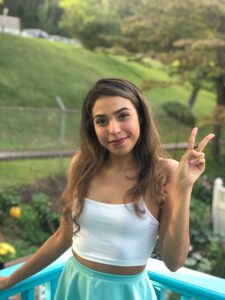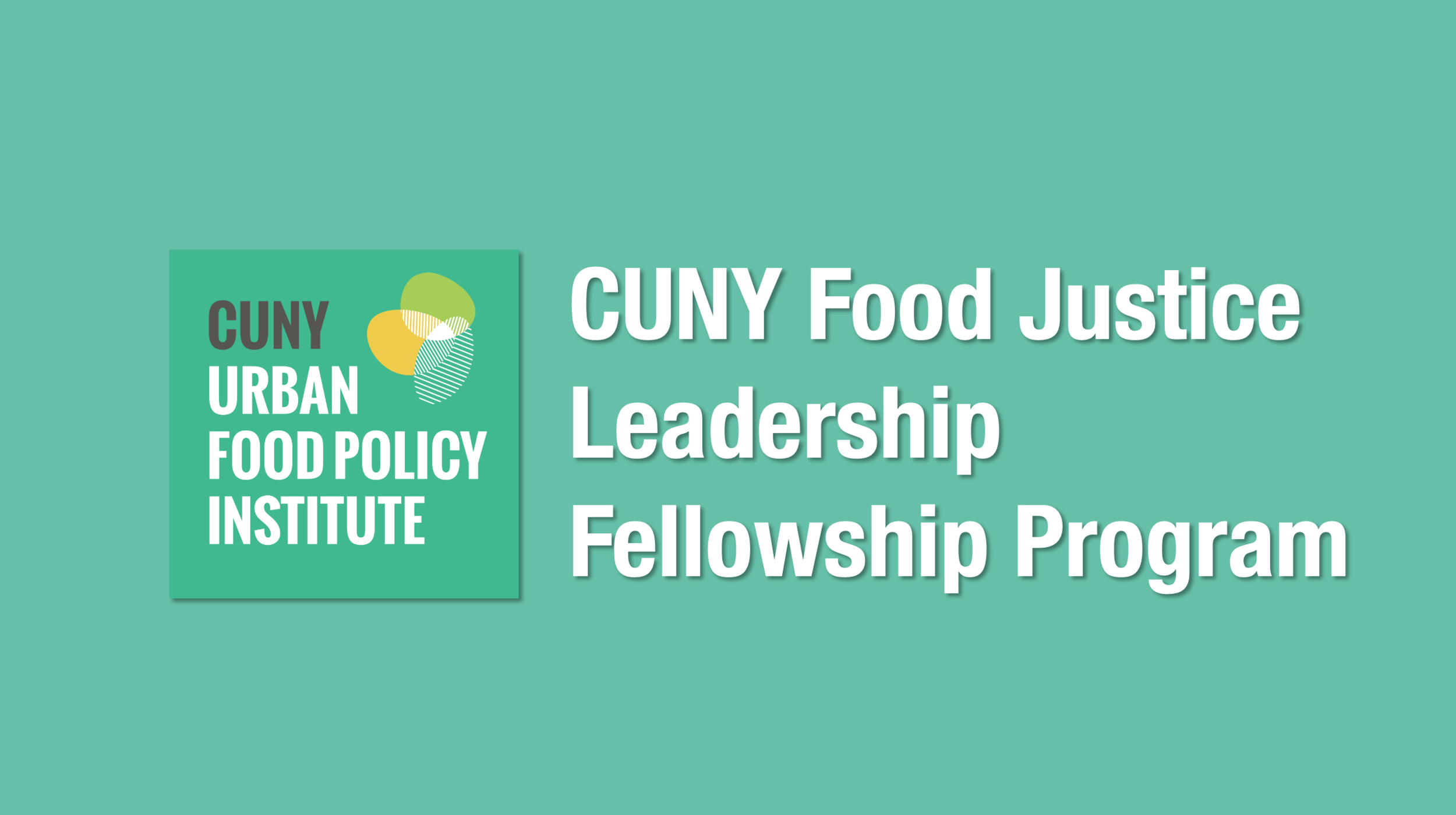
Kim Vargas
Earlier this year, the first cohort of CUNY Food Justice Leadership Fellows completed the yearlong training portion of the program and started 6-month internships with organizations committed to food justice and creating opportunities for young food justice leaders. To help you learn more about our Fellows, we will be publishing a series of interviews with them in the coming months. This month, Valerie Chong Nigg, Program Assistant for Youth & Community Development, CUNY Urban Food Policy Institute interviewed Kim Vargas, a recent Food Justice Leadership Fellow graduate from the CUNY Urban Food Policy Institute.
Valerie Chong Nigg (VCN): Tell us a little about yourself. What is your favorite food and why?
Kim Vargas (KV): My name is Kim. I’m a Senior Dietetic student at Lehman College and an intern at Just Food. For these past couple of months, I’ve been taking steps to become a Registered Dietitian (RD). I applied for Dietetics Internship and I matched with Lehman College, so I’ll be doing that next semester.
I would say mangos are my favorite food, just because I think they’re delicious, and you can find them in so many different countries, and they all taste a little bit different. They can be used in savory and sweet dishes, plus they make a great sorbet. I think it’s an all-around great fruit.
VCN: Why did you choose dietetics as your major?
KV: I’m interested in nutrition, especially the way food breaks down and functions in the body. It’s a relatively new science and I find that fascinating. We’re now making so many discoveries about gut bacteria and what it does to you in the long term. Many aspects of our health are tied to nutrition, but I don’t think it gets enough attention, especially depending on which demographics you’re in, you may not receive the best nutritional care. Those are some of the reasons why I want to become a dietician.
VCN: Why did you apply for the CUNY Food Justice Leadership Fellowship?
KV: I remember one of my teachers suggesting that we do internships and make connections with people in the field. I started looking at different opportunities, and that’s when I came across the CUNY Food Justice Leadership Fellowship. It caught my eye specifically because it was something that I hadn’t seen before, something that was heavily focused on public health. I applied because I didn’t think public health, specifically food justice, got enough attention, so I wanted to learn more about it. Prior to Covid-19, when I applied, food justice was an afterthought for most people. Since then, a lot has changed, food justice is now a rather popular topic. It’s really fascinating, to me, that it took a global pandemic for our government to acknowledge that food insecurity exists, not just in NYC but nationally.
VCN: What does food justice mean to you?
KV: Food justice to me means equity and fairness. Often, marginalized people don’t get the resources and access to the food they need. So, food justice to me is about taking responsibility for that and focusing on that, whether it’s through sustainability or accessibility.
VCN: What do you think is the greatest threat to food justice facing NYC today?
KV: Gentrification. People are pushed out and priced out of their neighborhoods, especially when it comes to renting or buying an apartment or simply going to the grocery store. Once people are pushed out of their communities, they have to move into food deserts or neighborhoods where there are very few grocery stores and those that exist, if any, don’t even sell the food they would like to eat. It’s a vicious cycle that needs to be stopped.
VCN: What is your ideal vision of the food landscape of NYC in 5 years?
KV: I would like for everybody to be able to access farmers markets and locally-grown food. I would like to see more community gardens around and more cooking demonstrations. I would like to see the Supplemental Nutrition Assistance Program (SNAP) expanded and for the income eligibility requirement to be revised. I think it’s unfair that the household income threshold is so low when the cost of living in NYC is so high.
VCN: What have you learned from being in the Fellowship? How has it influenced you in your work as a food justice advocate and leader?
KV: I learned a lot more about farming and farmers in general. Being raised here in New York, I wasn’t really in touch with anything that had to do with farming, but through the Fellowship I realized that there are a lot of farms in New York and also learned about some of the politics that shape them. For instance, I learned about the small farmers and how they’re being mistreated by larger corporations, such as Monsanto or the fact that Black farmers make up less than 1% of the entire farming demographic. Additionally, thanks to the Fellowship I’ve been doing community work with Just Food, and a lot of that work is focused on farmers and their CSAs. Knowing more about farming has helped me make connections and have a better overall idea of where my food is coming from.
VCN: Which Fellowship session was your favorite?
KV: Predatory marketing. Predatory marketing takes advantage of those who don’t know any better. It’s important to point it out to others who may not know so that they can be mindful that it exists and avoid it or at least understand what’s being advertised to them.
VCN: How has your relationship with the other Fellows and program staff contributed to this experience for you?
KV: I would say that it’s contributed positively. I’ve had an excellent experience with all the other Fellows and with the staff. Everybody’s always been very helpful. If I ever need anything, I know I can always reach out to them, so it always felt very comfortable and open—just a good environment. I didn’t have any issues or complaints because I knew that I could talk to somebody if any did arise and they would do the best they could to address the situation.
VCN: Tell us about your internship placement related to the Fellowship and what you’re working on.
KV: I was placed with Just Food. It’s been enjoyable, and I’ve been learning a lot. My supervisor is Sia Pickett, Community Chef and Board Treasurer, and we’ve been working on different projects together. For instance, I’ve been working on the newsletter and learning a lot about nonprofits. I’ve been working a lot on creating content for CSAs and farmers markets. I did a food demo recently, and that was fun. We made a beetroot potato salad based on an Ethiopian dish with a homemade vinaigrette. I’ve also done some research on statistics of the current state of New York. Over a million New Yorkers currently don’t have access to the internet, so we’ve been trying to figure out how to get in contact with them and connect them to the resources they may be missing. Many of the SNAP offices in the city have closed due to Covid-19, so most of the time, people have to call or go online to fill out the application.
We often expect nonprofits to solve federal level issues, but there’s a lot of back work that needs to be done, and most of the time, the staff isn’t ample enough. It’s pretty impressive to me that they can get so much done.
My favorite thing about working with Just Food is not so much the projects but the environment. I feel that the people I work with are very connected to the people in their neighborhoods. I don’t like when people are out of touch and then attempt to tell people what kind of help they need. The staff at Just Food ask how they can help.
VCN: Where do you see yourself in 5 years?
KV: I wrote a paper about this yesterday! In five years, I would like to be on the path to becoming an international humanitarian. Once I finish getting my RD license, I would like to see if I can transfer my skills to other countries and see where it takes me. I would also like to work for the UN and learn about nutrition, not just from a Western perspective. Food can be used as a medicine and I would love to learn more about it. So, in five years, I would like to be on that road to learning about non-Western food and nutrition and maybe practicing in other countries and, hopefully, bringing those practices back to the US.
By Valerie Chong Nigg
